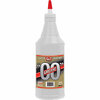TheFlynn01
Member
Hello everyone!
For those who remember, I had took down and fixed my Krag stock with the help from you all, Special thanks to Gunny! Now that I have it all apart and cleaned I was going to put her back together, and I was curious about grease vs oil? I have heard grease is great for storage, but would it also be good to put on parts of the gun that will not see the light of day for a very long time? The magazine spring and hinge bar on the Krag come to mind. As well as anything that is going to be covered up by the furniture or just resting on the stock. Would love to hear your thoughts!
Thank you!
For those who remember, I had took down and fixed my Krag stock with the help from you all, Special thanks to Gunny! Now that I have it all apart and cleaned I was going to put her back together, and I was curious about grease vs oil? I have heard grease is great for storage, but would it also be good to put on parts of the gun that will not see the light of day for a very long time? The magazine spring and hinge bar on the Krag come to mind. As well as anything that is going to be covered up by the furniture or just resting on the stock. Would love to hear your thoughts!
Thank you!


